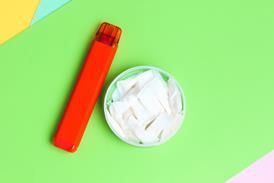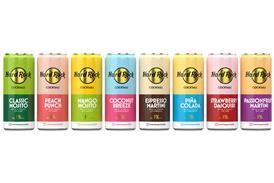Growing oral health consciousness is putting a smile on retailers' faces
It may be our obsession with celebrity smiles, or the realisation that the British as a nation have never really looked after their teeth, but whatever the reason there's currently plenty of action in the oral care market. According to Jon Sandy, oral care category manager for GlaxoSmithKline Consumer Healthcare (GSK), the sector is worth £700m, more than 10% of the total toiletries and healthcare category. "It's outperforming the total category, up 6% compared with category growth of 3%," he says. "Consumers' attitudes to oral care are changing - this reflects a growing health consciousness, changing eating habits and a desire to stay younger."
With a certain irony, the trend towards healthier eating is driving consumers towards more acidic foods such as fruit and salads - good for the heart, bad for the teeth.
Within the category, toothpaste unsurprisingly rules, with sales valued at £304m in 2006 (AC Nielsen) and growth of 3%. Battery powered and rechargeable brushes are making inroads into the dominance of the manual brush, with volume growth of 16% and 26%.
"There is no shortage of products to help consumers achieve healthy white teeth, fresh breath and a confident smile, but the oral care fixture can be confusing," says Sandy. "More clarity and greater excitement at the fixture will help engage consumers and drive sales. Retailers with close customer contact can play an important role in educating and advising - even simple educational messages can help drive impulse purchases."
He suggests displaying oral care advice leaflets within the store and creating a 'sensitive' area on the shelf highlighting paste, brushes and mouthwash, to create greater awareness of sensitive teeth and encourage regime purchases. "Although penetration of paste and brushes is high (82% and 62%), penetration of wash and floss stands at just 39% and 12% (TNS Worldpanel). Encouraging regime purchase - paste, brush, wash and floss - will benefit the nation's oral health while delivering sales," Sandy adds.
Mouthwash, in particular, is an area of growth, showing a 26% improvement to £128.1m sales in 2006 and penetration of 42.6%. "Mouthwash is the fastest growing category in the UK health and beauty market [IRI value sales], but in order to drive penetration, it's essential to bring in new users to the category," says Pfizer brand manager for Listerine, Matt Hair. The company's answer is to introduce a milder alternative, Listerine Softmint Sensation. "While many consumers feel that the invigorating effect is an essential part of the mouthwash experience, a high percentage of non-users prefer something a little milder," he says. "We expect Listerine Softmint Sensation to add millions of pounds to the mouthwash category, with more than half of this being incremental."
Include mouthwash, dental floss and specialist oral care products to cater for sensitivity, gum disease and denture users
Take advantage of consumers' ability to self-medicate through dual-siting
Merchandise products face-on to ensure clarity and prevent overcrowding
Site toothpastes at the centre of the fixture to drive consumers through the category
Site more expensive lines at start of traffic flow
Offer just a core range of toothbrushes.
Source: GSK
It may be our obsession with celebrity smiles, or the realisation that the British as a nation have never really looked after their teeth, but whatever the reason there's currently plenty of action in the oral care market. According to Jon Sandy, oral care category manager for GlaxoSmithKline Consumer Healthcare (GSK), the sector is worth £700m, more than 10% of the total toiletries and healthcare category. "It's outperforming the total category, up 6% compared with category growth of 3%," he says. "Consumers' attitudes to oral care are changing - this reflects a growing health consciousness, changing eating habits and a desire to stay younger."
With a certain irony, the trend towards healthier eating is driving consumers towards more acidic foods such as fruit and salads - good for the heart, bad for the teeth.
Within the category, toothpaste unsurprisingly rules, with sales valued at £304m in 2006 (AC Nielsen) and growth of 3%. Battery powered and rechargeable brushes are making inroads into the dominance of the manual brush, with volume growth of 16% and 26%.
"There is no shortage of products to help consumers achieve healthy white teeth, fresh breath and a confident smile, but the oral care fixture can be confusing," says Sandy. "More clarity and greater excitement at the fixture will help engage consumers and drive sales. Retailers with close customer contact can play an important role in educating and advising - even simple educational messages can help drive impulse purchases."
He suggests displaying oral care advice leaflets within the store and creating a 'sensitive' area on the shelf highlighting paste, brushes and mouthwash, to create greater awareness of sensitive teeth and encourage regime purchases. "Although penetration of paste and brushes is high (82% and 62%), penetration of wash and floss stands at just 39% and 12% (TNS Worldpanel). Encouraging regime purchase - paste, brush, wash and floss - will benefit the nation's oral health while delivering sales," Sandy adds.
Mouthwash, in particular, is an area of growth, showing a 26% improvement to £128.1m sales in 2006 and penetration of 42.6%. "Mouthwash is the fastest growing category in the UK health and beauty market [IRI value sales], but in order to drive penetration, it's essential to bring in new users to the category," says Pfizer brand manager for Listerine, Matt Hair. The company's answer is to introduce a milder alternative, Listerine Softmint Sensation. "While many consumers feel that the invigorating effect is an essential part of the mouthwash experience, a high percentage of non-users prefer something a little milder," he says. "We expect Listerine Softmint Sensation to add millions of pounds to the mouthwash category, with more than half of this being incremental."
How to brush up sales
Include mouthwash, dental floss and specialist oral care products to cater for sensitivity, gum disease and denture users
Take advantage of consumers' ability to self-medicate through dual-siting
Merchandise products face-on to ensure clarity and prevent overcrowding
Site toothpastes at the centre of the fixture to drive consumers through the category
Site more expensive lines at start of traffic flow
Offer just a core range of toothbrushes.
Source: GSK






























No comments yet